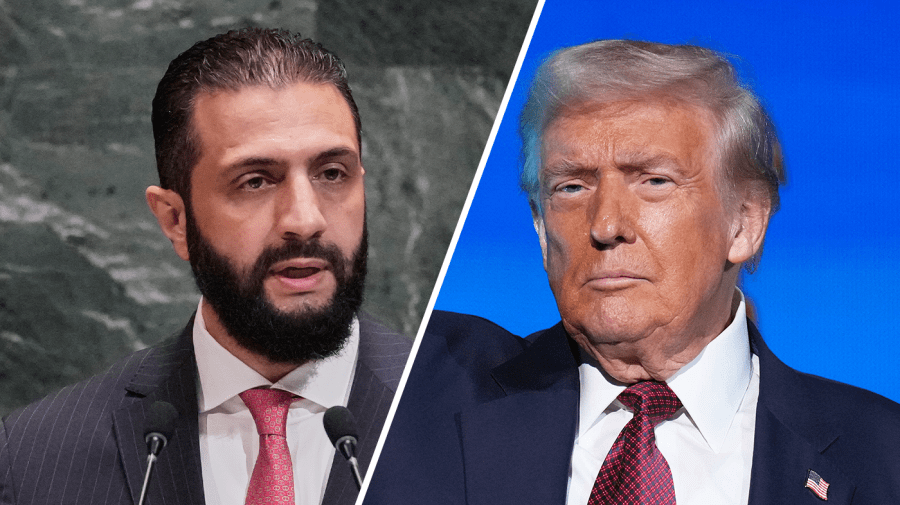
President Trump is welcoming Syria’s transitional President Ahmed al-Sharaa for a historic visit to the White House on Monday, a powerful symbol of the country’s return to the international community from its pariah status under the Assad regime.
Al-Sharaa will be the first Syrian leader to ever meet with the president at the White House. The visit is meant to further demonstrate al-Sharaa’s transformation from a jihadist fighting Americans in Iraq to a global statesman.
The visit comes nearly one year since al-Sharaa led a lightning offensive at the head of the formerly designated terrorist group Hay’at Tahrir al-Sham into Damascus, sending the country’s dictator for more than two decades, Bashar Assad, fleeing to Russia.
Since that time, the U.S. — under the Biden and Trump administrations — has taken steps to embrace al-Sharaa, viewing him as the best chance to rehabilitate Syria after more than 11 years of civil war, more than half a century of violent oppression, and ongoing challenges with sectarian violence.
Syria’s more-than-four-decade inclusion on the list of State Sponsors of Terrorism is likely to end in December, as the Trump administration works to lift all sanctions on the country.
“This regime has done a very good job, in spite of the speed bumps,” said Trump’s special envoy for Syria, Tom Barrack, speaking during the International Institute for Strategic Studies Manama Dialogue last week.
Not everyone in Washington is sold on al-Sharaa’s transformation. House Foreign Affairs Committee Chair Brian Mast (R-Fla.) is expressing concerns about Trump’s desire, and congressional efforts, to fully repeal the Caesar Syria Civilian Protection Act.
“Discussions on Caesar Repeal are ongoing but my concerns should be obvious to anyone following the situation in Syria,” Mast said in a statement to The Hill on Thursday, without elaborating.
Mast is part of a small bipartisan and bicameral group that is cautious about a full repeal, saying the legislation provides a framework to make sure al-Sharaa’s government follows through on key U.S. priorities: establishing inclusive governance, protection for minorities, religious freedom and ensuring justice.
Sectarian violence against Alawites on the Syrian coast in March, a terrorist attack targeting a church in Damascus in June and Bedouin attacks against the Druze in the south in July further fueled congressional concerns.
The Caesar sanctions were enacted in 2019 amid evidence of grave atrocities committed against civilians by the Assad regime, essentially blocking any international financing with Damascus.
A larger group of House and Senate lawmakers on both sides of the aisle, and a coalition of advocates — including the original authors of the Caesar act — said the legislation has served its purpose and hinders the new government’s efforts to rebuild the country, where an estimated 90 percent of the population is below the poverty line.
“We must repeal Caesar sanctions so the Syrian people have a real chance at recovery after decades of dictatorship,” Sen. Jeanne Shaheen (D-N.H.), the lead co-sponsor on the effort to repeal, said in a statement to The Hill.
“Ending these sanctions will allow American businesses and our allies to invest in a more stable, hopeful future in the Middle East, free from ISIS and the malign influence of Iran, Russia and China.”
Without repeal, Trump can only waive Caesar sanctions for six months at a time.
Meanwhile, the administration sponsored a resolution at the United Nations Security Council last week that removed international sanctions on al-Sharaa and Syria’s interior minister, Anas Khattab.
“We consider [this resolution] a sign of a growing confidence in the new Syria, its people and its leadership,” Syria’s U.N. delegate, Ambassador Ibrahim Abdulmalik Olabi, said, describing it as a “badge of honor” and adding that “Damascus continues to extend its hand to all countries of the world.”
The Trump administration removed Hay’at Tahrir al-Sham from its list of terrorist groups earlier this year, and the State Department on Friday removed al-Sharaa and the interior minister from the list of specially designated global terrorists.
“This new Syrian government, led by President al-Sharaa, is working hard to [find] missing Americans, fulfill its commitments on countering terrorism and narcotics, eliminating any remnants of chemical weapons, and promoting regional security and stability as well as an inclusive, Syrian-led and Syrian-owned political process,” State Department principal deputy spokesperson Tommy Pigott said in a statement.
For Trump, stability in Syria brings a host of benefits to the president’s larger goals in the Middle East, primarily as a strategic state to counter Iran’s influence — eliminating Syria as a base of operations for Iran’s proxy forces to proliferate and cutting off the weapons route to Hezbollah in Lebanon.
Al-Sharaa is expected to announce at the White House that Syria will join the international coalition to defeat the Islamic State group; remnants of the group across the region remain a persistent threat to peace and security.
Getting Syria to take on a greater security role could help Trump follow through on drawing down the approximately 2,000 U.S. troops in northeast Syria, a move he tried to make in his first term that was stymied by opponents in his administration and bipartisan members on Capitol Hill.
Syrian Minister of Information Hamza al-Mustafa rejected a report this week that the U.S. was looking to establish a military presence in Damascus.
A major priority for the president is to normalize ties between Israel and Syria, bringing Damascus into the Abraham Accords, Trump’s 2020 agreements that he has held up as worthy of the Nobel Peace Prize. The president on Thursday welcomed Kazakhstan, which had established ties with Israel in 1992, into the accords.
“What the president has done is actually signaled that the momentum of the Abraham Accords is alive and well in the second administration. I think it’s not just going to be Kazakhstan, but also a number of other countries that join in the months to come,” Vice President Vance said Thursday.
Barrack said last week that Israel and Syria are on their fifth set of discussions surrounding their borders, boundaries and “de-escalation.”
“You could very quickly have a realignment of a tapestry that we haven’t seen in the Middle East,” he said.
What Trump is trying to achieve with Syria fits into his larger vision for the Middle East, moving beyond historic grievances to focus on mutual economic benefit.
“At a moment where you have a president of the United States … saying ‘enough.’ A hundred years of this confusion, of these old thoughts, of these old ideas and people not moving off of them, when you have the most dominant region in the world — if you combine capital with fossil fuels with resourceful people — has got to end,” Barrack said.
“And that’s where he is. That’s what we’re trying to do.”

